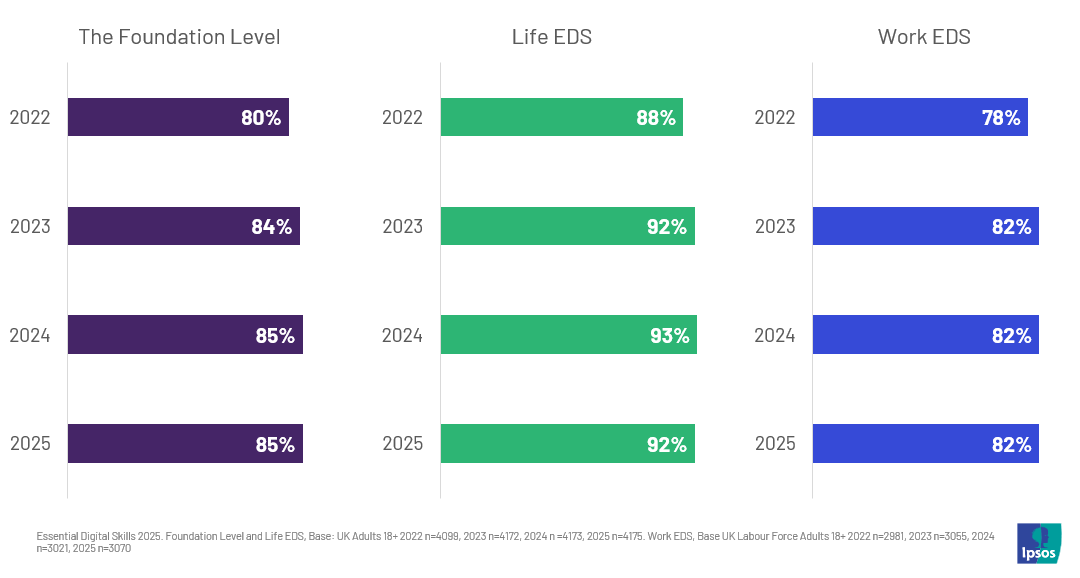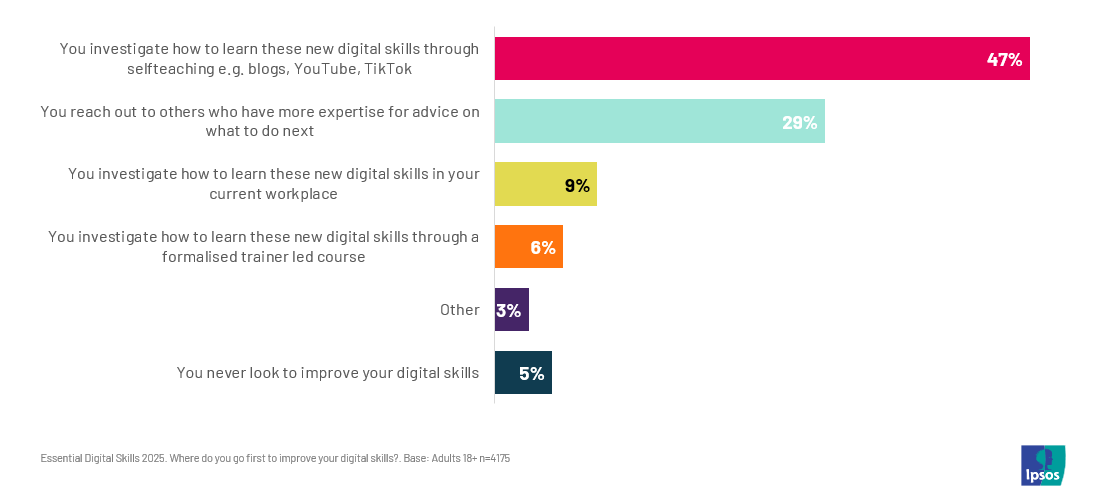Lloyds Essential Digital Skills 2025
Being able to measure digital ability is increasingly important in a world that is increasingly ‘digital first’. Engaging with this digital transformation comes with benefits that affect all areas of people’s lives, from communication and access to vital information and services to greater convenience, flexibility, and monetary rewards. However, these benefits cannot be enjoyed by all if there are groups within our society who are unable to partake in activities online.
The Essential Digital Skills (EDS) study identifies gaps in digital capabilities and which groups in society may need support to participate in online tasks. The EDS framework measures digital ability across three levels:
- The Foundation Level (the baseline level of digital skills in the EDS framework)
- Life EDS (the measure of digital skills needed for your personal life)
- Work EDS (the measure of digital skills needed for your working life)
The current iteration of the framework is now in its fourth year of tracking.
What does it mean to have these attainments in digital ability?
The Foundation Level has been attained by 85% of UK adults aged 18+, meaning they can independently perform all eight basic digital tasks identified as necessary to get online (e.g., opening an internet browser, setting up a Wi-Fi connection).
Essential Digital Skills for Life (Life EDS) refers to having the digital skills needed for your personal life. To attain Life EDS, you must have all five Life skills, indicating a range of digital ability – Communicating; Being Safe and Legal Online; Handling Information and Content; Transacting; and Problem Solving. 92% of UK adults 18+ have Life EDS.
Essential Digital Skills for Work (Work EDS) is a measurement of your range of digital skills needed for your working life. This is recorded across a different sample: UK labour force adults (i.e. adults 18+ who are not retired). Otherwise, it’s measured similarly to that of Life EDS - to have Work EDS you must have all the five Work skills – Communicating; Being Safe and Legal Online; Handling Information and Content; Transacting; and Problem Solving. 83% of UK labour force adults have Work EDS.

Attainment of the Foundation Level, Life EDS and Work EDS has been stable since 2023, following uplifts across the board in 2022. Although we see stability, there’s a lot to learn from the EDS framework. We see distinct gaps of people who don’t have each of the skill levels, and those with lower digital ability are overrepresented by those who are older, female, from a lower social grade (C2DE), lower level of education (i.e. no formal qualifications), have an impairment or are not working.
While we know that there are key areas to target, there’s also the question of what can be done next to facilitate this upskilling of UK adults.

Within the EDS survey, UK adults were also asked where they first go to improve their digital skills. The most popular path people take is self-teaching, using resources such as YouTube, blogs, or TikTok. The next most prominent answer is that they reach out to others who have more expertise for advice. The data shows that learning styles are not universal. There is a distinction in answers based on demographics, which are strongly associated with higher or lower digital skills.
For example, it’s more likely, across the total sample, to self-teach than to reach out, and this continues to be the case across age groups until the 65+ age group. Those aged 65 and over are more likely to seek advice from others (45%) than to teach themselves (31%).
Those more likely to self-teach are male, younger, of a higher social grade, with a higher education level (i.e., university-level education), not living with any impairments, and in work. On the other end, we can see that those more likely to reach out are their counterparts, i.e. female, older, of a lower social grade, of a lower level of education (i.e. no formal qualifications), have an impairment or are not working. As these are groups more strongly associated with lower digital skills, it may be their lack of confidence online that influences their primary learning channel.
Thus, for a successful plan in digital upskilling, there needs to be a two-pronged approach. This includes options for both an easily accessible library of high-quality resources for those who are already more confident in their digital skill and; one-to-one community support and training for those who have a lower level of digital ability.
For further information on compelling stories within the data, find the full report below.
Technical Note
Ipsos interviewed 4,175 participants aged 18+ years in the UK (Great Britain and Northern Ireland) via their telephone Omnibus across 5th March – 2nd April 2025. Data are weighted to represent the UK population in terms of age, social grade, region and working status within the gender variable and additional profiles on tenure and ethnicity using PAMCo data. Data are further weighted on device ownership using data derived from a robust national survey.
Appendix
Across the five Life skills are 26 Life tasks that adults may need for their everyday life - to have a skill, you only need to be able to do one task that sits within it. This includes tasks such as being able to use search engines; make and receive video calls; set up an account to buy goods and services online; use the internet to improve your skills and ability to do new things; and follow data protection guidelines online. It’s important to note that Life EDS is driven by having a range of ability, not full depth - you do not need to be able to do all 26 Life tasks to have Life EDS.
There are 20 Work tasks that sit across the five Work skills, which are relevant for the workplace. This includes being able to use workplace digital tools to create, share and collaborate with colleagues; securely access, synchronise and share information at work across different devices; access salary and tax information digitally; use appropriate software that is required of your day-to-day job; and recognise suspicious links and know that clicking on these links or downloading unfamiliar attachments is a risk. As mentioned for Life EDS, you do not need the ability to do each of 20 Work tasks - you need to have a range across the skills.






